The SIUE School of Business Executive Education program is offering its spring 2020 professional development courses and workshops, including the associate professional in human resources certification (aPHR) course and the SIUE Leadership Bootcamp.
Associate Professional in Human Resources (aPHR) Certification Course: Saturday and Sunday, April 4-5
This course is designed to prepare HR concentration students for the aPHR exam offered by HRCI (hrci.org/aphr). The aPHR exam is the associate professional in human resources exam, designed to test your knowledge of human resource topics as you begin your professional career. Unlike the Professional in Human Resources (PHR) and Senior Professional in Human Resources (SPHR) certifications, no experience is necessary to take and secure the aPHR certification. The aPHR certification signals to employers an individual has the knowledge needed to be a successful HR professional.
A trained instructor from SIUE will cover the material during one weekend from 9 a.m.-3 p.m. each day in Founders Hall, classroom 2300. There will be in-class work, as well as outside reading, preparation and test practice.
Course cost is $475 including instruction and all practice materials. Registration for the preparation course does not include exam registration price. See HRCI’s website about exam registration costs.
For more information and to register for the course, visit siue.edu/business/executive-education/professional-development/events-feed.
SIUE Leadership Bootcamp: Fridays - April 17, 24; May 8, 15, 22
Gain valuable leadership skills in this 5-day leadership bootcamp by attending all 5 days or just choosing the sessions that most interest you. Morning sessions are 8:30 a.m.–noon, while afternoon sessions are 12:30-4 p.m.
April 17
AM Session: Strategic Planning & Setting Priorities
The purpose is to demonstrate the importance of strategic planning and setting priorities by having a strategic mindset that guides the leader’s daily activities. The strategic planning process will be addressed at the macro level to focus the leader on the framework and mentality needed to lead an organization with strategy in mind. The alignment of organizational strategic initiatives and functional level activities will be emphasized. Topics such as market understanding and awareness, setting strategic priorities, and the relationship between strategy and company culture will help the leader identify adaptive challenges to ensure strategic initiatives are in alignment with individual, business unit, and organizational capabilities and values.
PM Session: Results Orientation
This session takes the next step from strategic thinking to a results orientation that has an impact on the organization’s bottom line. Participants will be taken from macro- to micro-level analysis to demonstrate the importance of aligning goal setting with organizational initiatives. At a functional level, leaders must establish goals for themselves and their department/business unit, juggle competing priorities, and effectively handle time management. Tools such as Covey's Urgent/Important Matrix, as well as guidelines for how and when to delegate to others are a key part of maintaining a results orientation and setting priorities. Lastly, emphasis on key performance indicators (KPIs) and organizational metrics will drive this session to ensure results are in alignment with strategic goals.
April 24
AM Session: Critical Thinking and Problem-Solving
The ability to think critically is a crucial skill set because an essential measure of an organization’s success is its ability to overcome problems. Participants will start with learning their decision-making style and will be given a brief overview of the decision-making process. This will be followed by learning how to identify priorities based on company strategy, frame problems and formulate effective decision criteria to arrive at the best solution. Particular attention will be given to helping participants recognize potential biases that may enter the decision process, short-circuiting their ability to think critically.
PM Session: Change Leadership and Innovation
Leadership is taken a step further, addressing the question of how do you lead in tough times with difficult people along an uncertain road? Based on the groundbreaking insights and strategies from Harvard’s Center for Public Leadership, this session focuses on how leaders move organizations through adaptive change, and identify techniques and strategies to engage subordinates to face the tough challenges of uncertain times. Participants will learn a framework focusing on conflict management, persuasion, and influence techniques to engage employees to work to successfully complete organizational objectives.
Fostering innovation is also a key part of managing change and uncertainty. When innovation is fostered, a culture is created that values risk-taking, fosters open communication and empowerment, and streamlines decision-making for relevance, responsiveness, resourcefulness, and resilience. This session will also explore ways to enhance individual creativity and creativity within a team. Discover the leadership skills necessary to help teams find new and better ways to do things to make departments and units more effective.
May 8
AM Session: Team Building & Trust
The focus will be on what it means to be an effective team and how to get there. First, the elements of trust will be addressed. Trust is easy to lose and hard to regain once lost. When team members feel as if they can trust their teammates and superiors, the organization has strong building blocks to be effective and meet its goals. Because trust is a necessary prerequisite to a high functioning workforce, the importance of trust, ways to build trust and how to navigate when trust is broken will be addressed. Participants will look at the different stages of team development, important actions to take in order to become an effective team, how to maintain an effective team status and the benefits of doing so. Finally, the different steps involved in problem-solving will be addressed, discussing the challenges and solutions to collaborating as a team and emphasizing the key benefits of working together. Participants will do assessments and exercises to create an action plan that they can put into use in their respective offices.
PM Session: Leadership/Followership and Developing Employees
The leadership/followership relationship requires an understanding of the unique contributions that both parties offer to the organization. The dynamics of that relationship will be addressed demonstrating that both leaders and followers work in concert to reach the organization’s strategic goals. A key aspect of the leadership/followership relationship is the importance of developing subordinates with a growth mindset to benefit the organization, as well as the employee. Growth mindset principles allow teams and individuals to continually develop. They also develop awareness of how individual and group attitudes impact the development and ability of others. We will discuss the role of coaching and mentoring as key tools for employee development. Coaching for performance improvement and disciplinary issues is essential for maximizing employee performance, and managing behavioral lapses that can interfere with a smooth functioning department. Factors contributing to successful mentoring programs will also be addressed.
May 15
AM Session: Collaboration and Influence
Learning to call on others for feedback and support is an essential skillset for success. Research shows that the better leaders are at managing and navigating networks and partnerships, the more they achieve their goals. But despite its importance, networking can seem distasteful, self-serving and even phony. In this workshop, participants will focus on growing their partner network and utilizing this network to increase productivity. Influence is crucial for leaders to develop networks and effectively collaborate with others. This session addresses the importance of persuading, motivating, and influencing both direct reports and other employees when we are in the midst of managing daily workflows. This includes the different tools we can use to influence both superiors and subordinates. Case exercises on persuasion and influence will be used to provide participants with a tool kit of techniques to help manage in a wide variety of contexts.
PM Session: Communication and Listening
Both written and oral communication are the keys to being a successful manager, supervisor and employee. Participants will be taken through a series of experiential exercises to understand and recognize three-part communication – words, tone and body language. The do’s and don’ts of written communication, including emails, social media and report writing, will be addressed. Participants will also learn how to practice active listening to learn how to listen to understand, not listen to respond to their communication partner.
May 22
AM Session: Art and Science of Negotiation
Negotiation is often defined as discussion aimed at reaching an agreement. All too often, though, we look at negotiation as a means to an end, rather than an opportunity to improve and strengthen relationships, particularly with diverse others. Through a series of exercises and role-play activities, participants will learn and practice the science of negotiation while becoming familiar with their own interpersonal style. We will also address the foundations of conflict management styles. Conflict is not inherently bad for organizations. Therefore, participants will learn their own conflict management style and practice the skills needed to effectively influence and negotiate to achieve desired outcomes. By the end of the session, participants will have a clear idea about their default conflict style, have a tool kit for adapting their style as needed given differing strategic circumstances and will practice the essential skills needed for good negotiation.
PM Session: Difficult Conversations and Diverse Others
Many companies are making efforts to achieve workforce diversity. Diversity can bring both tangible and intangible benefits to the organization. In order for a company to realize these benefits, managers and employees need to be able to work together, be open to different perspectives and find ways to build positive relationships. The purpose is to gain a better understanding and appreciation for diversity, to develop different approaches when dealing with diverse individuals, and to examine our own emotional management. Using a framework around having difficult conversations, participants will be introduced to diversity-related concepts and given the tools needed to navigate difficult conversations with diverse others. These are all key skills needed to work with people at all levels of the organizations.
To register, call Kristine Jarden at 618-650-2668, or Deanna Lotter at 618-650-5440 or visit: siue.edu/business/executive-education/index.shtml A listing of additional courses can also be found at this site.
![]()
 College Factual’s 2020 Best Value Computer Science Programs ranks Southern Illinois University Edwardsville’s School of Engineering fourth nationally and No. 1 in Illinois as “Best Value for the Money.” Additionally, SIUE’s Civil Engineering and Mechanical Engineering programs are among the top 15 percent nationally as “Best Value for the Money.”
College Factual’s 2020 Best Value Computer Science Programs ranks Southern Illinois University Edwardsville’s School of Engineering fourth nationally and No. 1 in Illinois as “Best Value for the Money.” Additionally, SIUE’s Civil Engineering and Mechanical Engineering programs are among the top 15 percent nationally as “Best Value for the Money.”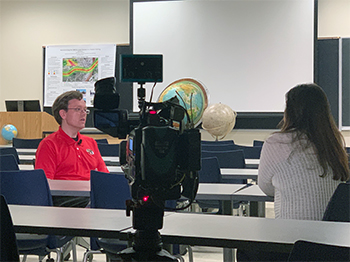 SIUE’s Alan Black, PhD, assistant professor in the Department of Geography, was a featured weather expert in a FOX2 News story on “Debunking Tornado Safety Myths.”
SIUE’s Alan Black, PhD, assistant professor in the Department of Geography, was a featured weather expert in a FOX2 News story on “Debunking Tornado Safety Myths.” From an early age, Congressman John Shimkus (R-15th District-Collinsville), watched his father, Gene Shimkus, study and then graduate from the local university, which was still somewhat new, but offered a world of opportunities. Over the years, Shimkus, two sisters, his wife and son followed in his father’s footsteps in graduating from Southern Illinois University Edwardsville.
From an early age, Congressman John Shimkus (R-15th District-Collinsville), watched his father, Gene Shimkus, study and then graduate from the local university, which was still somewhat new, but offered a world of opportunities. Over the years, Shimkus, two sisters, his wife and son followed in his father’s footsteps in graduating from Southern Illinois University Edwardsville. 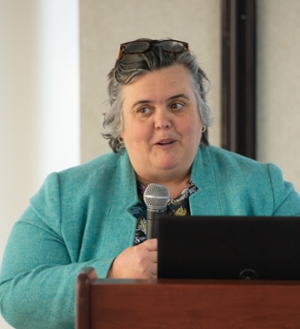 Everyone talks about power, but what is important is to have influence, according to Southern Illinois University Edwardsville Provost and Vice Chancellor for Academic Affairs Denise Cobb, PhD. Cobb gave the welcome during Tea and Talk, on Tuesday, March 3, to kick off Women History Month.
Everyone talks about power, but what is important is to have influence, according to Southern Illinois University Edwardsville Provost and Vice Chancellor for Academic Affairs Denise Cobb, PhD. Cobb gave the welcome during Tea and Talk, on Tuesday, March 3, to kick off Women History Month. 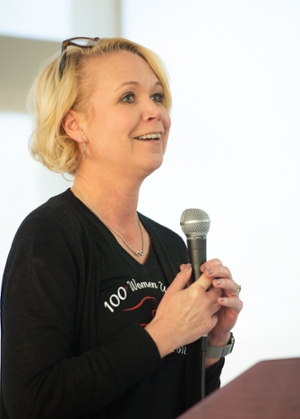 “There is a social tendency toward building networks with people who are most like yourself. Those are not the ones that help us be better thinkers or confront issues differently. You have to develop diverse networks that can affect change.”
“There is a social tendency toward building networks with people who are most like yourself. Those are not the ones that help us be better thinkers or confront issues differently. You have to develop diverse networks that can affect change.”  The concept involves women meeting four times a year and each giving $100. Each woman can nominate a non-profit of her choice. Three agency names are pulled, and those who nominated the group give a short presentation. Afterwards, the group votes, and the non-profit receiving the most ballots gets the pool of money.
The concept involves women meeting four times a year and each giving $100. Each woman can nominate a non-profit of her choice. Three agency names are pulled, and those who nominated the group give a short presentation. Afterwards, the group votes, and the non-profit receiving the most ballots gets the pool of money.  The National Development Council (NDC) is partnering with the Illinois SBDC for the Metro East at Southern Illinois University Edwardsville to bring two valuable small business financial sessions to the area.
The National Development Council (NDC) is partnering with the Illinois SBDC for the Metro East at Southern Illinois University Edwardsville to bring two valuable small business financial sessions to the area. Registration is open for Southern Illinois University Edwardsville’s fourth annual Decades Dash. The 5K run starts at 9 a.m. Saturday, April 4 at the Morris University Center on campus.
Registration is open for Southern Illinois University Edwardsville’s fourth annual Decades Dash. The 5K run starts at 9 a.m. Saturday, April 4 at the Morris University Center on campus. Southern Illinois University Edwardsville alumnus Tron Young, EdD, has been named the 2020 Illinois Middle School Principal of the Year by Horace Mann and the Illinois Principals Association (IPA). Young is principal of Joseph Arthur Middle School in O’Fallon and is known for leading with purpose.
Southern Illinois University Edwardsville alumnus Tron Young, EdD, has been named the 2020 Illinois Middle School Principal of the Year by Horace Mann and the Illinois Principals Association (IPA). Young is principal of Joseph Arthur Middle School in O’Fallon and is known for leading with purpose. Southern Illinois University Edwardsville’s Morris University Center was bustling with activity as area employers connected with eager job, co-op, internship and graduate school candidates during the Career Development Center’s (CDC) Spring Career Fairs held Wednesday and Thursday, March 4-5.
Southern Illinois University Edwardsville’s Morris University Center was bustling with activity as area employers connected with eager job, co-op, internship and graduate school candidates during the Career Development Center’s (CDC) Spring Career Fairs held Wednesday and Thursday, March 4-5. Employers continue to show interest in talented SIUE students and alumni as they look to recruit the next generation of employees.”
Employers continue to show interest in talented SIUE students and alumni as they look to recruit the next generation of employees.” “We are interested in bachelor’s possessing engineers, primarily right out of college with degrees in civil, mechanical and electrical engineering,” said Kathryn Taylor, Human Resources Specialist with the Illinois Environmental Protection Agency. “We have a demand for engineers, and we’ve been able to obtain a few good employees/hires from these events.”
“We are interested in bachelor’s possessing engineers, primarily right out of college with degrees in civil, mechanical and electrical engineering,” said Kathryn Taylor, Human Resources Specialist with the Illinois Environmental Protection Agency. “We have a demand for engineers, and we’ve been able to obtain a few good employees/hires from these events.”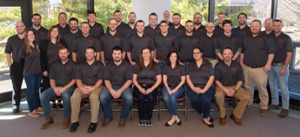 The Construction Leadership Institute (CLI) at Southern Illinois University Edwardsville celebrated 32 graduates on Friday, March 6 as a part of the CLI Alumni Day and Graduation celebration. S.M. Wilson & Co. Chief Operating Officer Mark Cochran received the Alumni Leadership Award.
The Construction Leadership Institute (CLI) at Southern Illinois University Edwardsville celebrated 32 graduates on Friday, March 6 as a part of the CLI Alumni Day and Graduation celebration. S.M. Wilson & Co. Chief Operating Officer Mark Cochran received the Alumni Leadership Award. The Alumni Leadership Award recognizes an outstanding graduate who has demonstrated exceptional leadership and service to the St. Louis area building community. Cochran has risen from project engineer to the firm’s first COO after serving as a project manager, director of field operations and director of operations.
The Alumni Leadership Award recognizes an outstanding graduate who has demonstrated exceptional leadership and service to the St. Louis area building community. Cochran has risen from project engineer to the firm’s first COO after serving as a project manager, director of field operations and director of operations.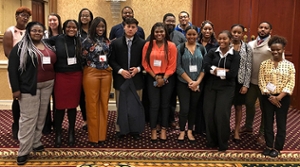 Southern Illinois University Edwardsville chemistry and biological sciences students displayed their prowess in scientific research when they attended the Illinois Louis Stokes Alliance for Minority Participation (LSAMP) 2020 Spring Symposium in STEM on Feb. 28-29 in Lisle. Of the 17 SIUE students who attended, 10 presented their research and two, seniors Jochabay McGeeBey and Jordan Robinson, earned awards.
Southern Illinois University Edwardsville chemistry and biological sciences students displayed their prowess in scientific research when they attended the Illinois Louis Stokes Alliance for Minority Participation (LSAMP) 2020 Spring Symposium in STEM on Feb. 28-29 in Lisle. Of the 17 SIUE students who attended, 10 presented their research and two, seniors Jochabay McGeeBey and Jordan Robinson, earned awards. Prospective students and the general public are invited to learn more about graduate studies at Southern Illinois University Edwardsville’s joint Graduate Admissions Open House and Graduate School Research Symposium on Tuesday, March 31.
Prospective students and the general public are invited to learn more about graduate studies at Southern Illinois University Edwardsville’s joint Graduate Admissions Open House and Graduate School Research Symposium on Tuesday, March 31. Prospective students and the general public are also invited to become inspired at the
Prospective students and the general public are also invited to become inspired at the 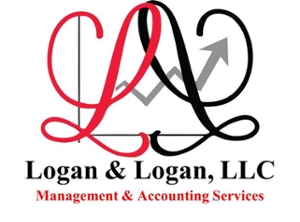 Logan & Logan Management and Accounting Services, LLC, will celebrate its grand opening on at 2 p.m. Friday March 13 at 821 South Belt West in Belleville.
Logan & Logan Management and Accounting Services, LLC, will celebrate its grand opening on at 2 p.m. Friday March 13 at 821 South Belt West in Belleville.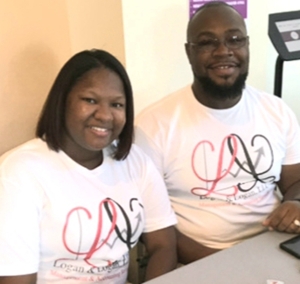 “It is a pleasure advising the Logans,” DiMaggio May added “They are receptive to advice and ideas, eager to make their company succeed. The Logans are hard-working and dedicated to customer service, and I look forward to helping them along the way.”
“It is a pleasure advising the Logans,” DiMaggio May added “They are receptive to advice and ideas, eager to make their company succeed. The Logans are hard-working and dedicated to customer service, and I look forward to helping them along the way.” The field of computer science is a rapidly growing field with a projected employment growth rate of 19 percent by 2026. The Southern Illinois University Edwardsville School of Engineering’s Department of Computer Science (CS) wants to ensure females are a part of the field’s surging growth and success.
The field of computer science is a rapidly growing field with a projected employment growth rate of 19 percent by 2026. The Southern Illinois University Edwardsville School of Engineering’s Department of Computer Science (CS) wants to ensure females are a part of the field’s surging growth and success.
 Photos: (L-R) Juniors Abby Liu, of Edwardsville, and Nyla Cohen, of Cahokia, work together during SheCode.
Photos: (L-R) Juniors Abby Liu, of Edwardsville, and Nyla Cohen, of Cahokia, work together during SheCode.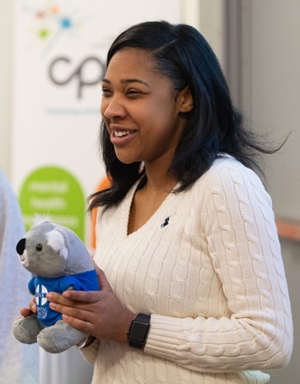 A leading institution of pharmaceutical education, the Southern Illinois University Edwardsville School of Pharmacy (SOP) is one of only a few institutions in the country to have incorporated an important Mental Health First Aid (MHFA) training course to its curriculum for first-year (P1) students.
A leading institution of pharmaceutical education, the Southern Illinois University Edwardsville School of Pharmacy (SOP) is one of only a few institutions in the country to have incorporated an important Mental Health First Aid (MHFA) training course to its curriculum for first-year (P1) students.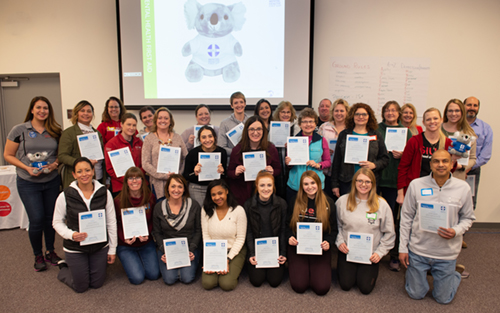 “SIUE School of Pharmacy Dean Mark Luer and faculty overwhelmingly supported the integration of this program into our P1 academic year,” Gonzalez said. “When we incorporate MHFA into the SOP curriculum, it sends a message to both students and the community that having an understanding and knowledge of how to respond to a mental health crisis is just as important as other health crises.”
“SIUE School of Pharmacy Dean Mark Luer and faculty overwhelmingly supported the integration of this program into our P1 academic year,” Gonzalez said. “When we incorporate MHFA into the SOP curriculum, it sends a message to both students and the community that having an understanding and knowledge of how to respond to a mental health crisis is just as important as other health crises.”